Discover nature's potent defense against colds with an immune-boosting herbal tea blend. You'll harness the power of herbs like echinacea, elderberry, and ginger to fortify your body's defenses. This natural shield combines antioxidants, anti-inflammatory compounds, and immune-stimulating properties to ward off illness. By creating your own blend, you'll enjoy a flavorful, caffeine-free alternative that hydrates and calms. Brew it properly, consume it regularly, and store it correctly to maximize its benefits. Remember to reflect on potential side effects and consult a healthcare provider if needed. Explore how this ancient wisdom, backed by modern science, can transform your wellness routine.
Benefits of Herbal Tea
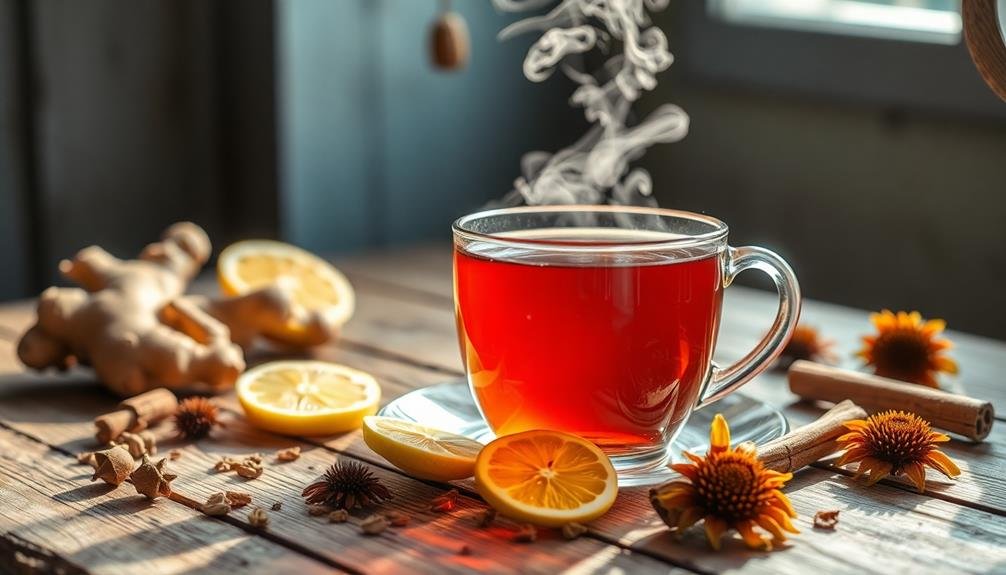
Herbal tea offers a wealth of benefits for your overall health and well-being. When you sip on a warm cup of herbal infusion, you're not just enjoying a comforting beverage; you're also nourishing your body with natural compounds that can boost your immune system, reduce inflammation, and promote relaxation.
Many herbal teas contain antioxidants that help protect your cells from damage caused by free radicals. These antioxidants can lower your risk of chronic diseases and support healthy aging.
Some herbal teas, like chamomile and lavender, have calming properties that can reduce stress and improve sleep quality. Others, such as peppermint and ginger, can aid digestion and alleviate nausea.
Herbal teas are typically caffeine-free, making them an excellent alternative to coffee or traditional tea for those looking to reduce their caffeine intake. They're also hydrating and can contribute to your daily fluid intake.
Key Immune-Boosting Herbs
When it comes to boosting your immune system, certain herbs stand out for their potent properties. Echinacea tops the list, known for its ability to stimulate white blood cell production and enhance your body's natural defense mechanisms. It's particularly effective at the onset of cold and flu symptoms.
Elderberry is another powerhouse, rich in antioxidants and vitamin C. It's been shown to reduce the severity and duration of colds and flu.
Ginger, with its anti-inflammatory and antioxidant properties, can help fight infections and soothe sore throats.
Astragalus root is a staple in Traditional Chinese Medicine, prized for its immune-boosting and stress-reducing effects. It's often used as a preventive measure during cold and flu season.
Turmeric, containing curcumin, offers potent anti-inflammatory and antioxidant benefits that can enhance immune function.
Don't overlook the power of garlic. It contains allicin, a compound with strong antimicrobial properties.
Creating Your Tea Blend
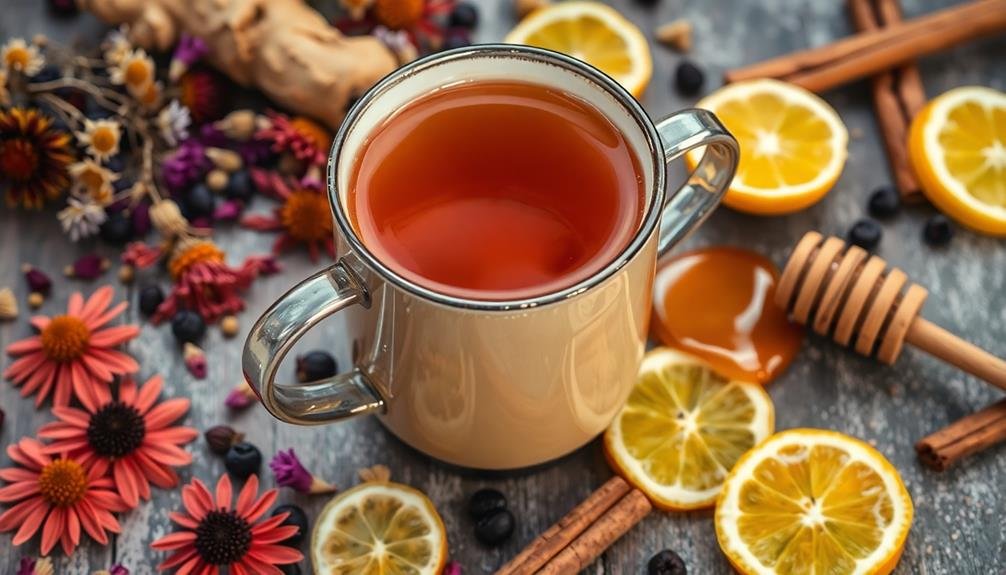
Crafting your personalized immune-boosting tea blend is both an art and a science. You'll want to combine herbs that not only taste great together but also complement each other's medicinal properties.
Start with a base herb like echinacea or elderberry, known for their potent immune-boosting effects. Add ginger or turmeric for their anti-inflammatory properties and to enhance the flavor profile.
Next, consider including adaptogens like astragalus or reishi mushroom to help your body cope with stress. For a soothing touch, incorporate chamomile or lemon balm.
Don't forget to add vitamin C-rich herbs like rose hips or hibiscus to further support your immune system.
When measuring your herbs, use about 1 teaspoon of dried herbs per cup of water. Experiment with different ratios to find your perfect blend.
Steep your tea for 5-10 minutes, depending on the herbs used and your desired strength. Remember, some herbs may interact with medications or have contraindications, so it's wise to consult with a healthcare professional before regularly consuming your blend, especially if you have existing health conditions or are pregnant.
Proper Brewing Techniques
To brew your immune-boosting herbal tea blend effectively, you'll need to take into account three key factors.
First, pay attention to steeping time, as oversteeping can lead to bitter flavors while understeeping may not extract the full benefits.
Second, use the right water temperature for your herbs, as some delicate ingredients require cooler water to preserve their properties.
Third, maintain the proper herb-to-water ratio to guarantee a balanced and potent brew.
Steeping Time Matters
For ideal flavor and potency, steeping time is essential when brewing your immune-boosting herbal tea blend. Different herbs release their beneficial compounds at varying rates, so it's vital to steep your tea for the right duration. Generally, you'll want to steep your blend for 5 to 10 minutes to extract the maximum health benefits.
Start by bringing fresh, cold water to a boil. Once boiling, remove it from heat and let it cool for about 30 seconds before pouring over your herbal blend. This slight cooling prevents scalding delicate herbs. Cover your cup or teapot to retain heat and aromatic compounds.
As you steep, gently swirl or stir the blend occasionally to encourage even extraction. Don't over-steep your tea, as this can lead to a bitter taste and potentially reduce some of the herbs' beneficial properties. If you prefer a stronger flavor, add more herbs rather than extending the steeping time.
Water Temperature Considerations
While steeping time plays a key role in brewing the perfect immune-boosting tea, water temperature is equally important. Different herbs require specific temperatures to release their beneficial compounds effectively.
For delicate herbs like chamomile or peppermint, use water that's around 175°F (80°C) to avoid scorching the leaves and creating a bitter taste. Heartier herbs such as ginger or echinacea can withstand higher temperatures, so aim for 185-195°F (85-90°C).
For green tea, which is often included in immune-boosting blends, keep the water temperature between 160-180°F (71-82°C) to preserve its catechins and avoid bitterness. Black tea, on the other hand, can handle boiling water at 212°F (100°C).
If you're using a blend of herbs, opt for a temperature that suits the most delicate ingredient.
Don't have a thermometer? Here's a quick trick: Let boiling water cool for about 2-3 minutes for most herbal teas, or 30 seconds to 1 minute for green tea.
Proper Herb-To-Water Ratio
When it comes to brewing the perfect immune-boosting herbal tea, achieving the right herb-to-water ratio is essential. You'll want to strike a balance between flavor and potency to maximize the tea's immune-boosting properties. Generally, use 1 to 2 teaspoons of dried herbs or 1 tablespoon of fresh herbs per cup of water. However, this can vary depending on the specific herbs in your blend and personal preference.
To guarantee you're getting the most out of your herbal tea, consider these key factors:
- Herb type: Lighter herbs like mint may require more, while stronger herbs like ginger need less.
- Desired strength: Adjust the ratio for a milder or more robust flavor.
- Steeping time: Longer steeping can compensate for fewer herbs.
- Water volume: Scale the herb amount proportionally when making larger batches.
Recommended Daily Intake
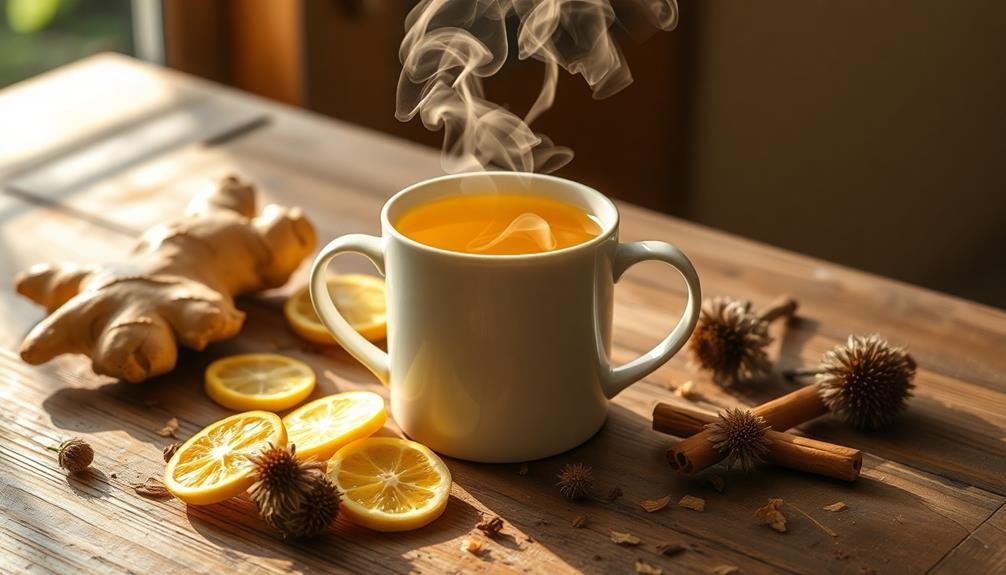
Moderation is key when consuming this immune-boosting herbal tea blend. While it's tempting to drink large quantities, especially when you're feeling under the weather, it's important to stick to recommended daily intake guidelines. For most adults, 2-3 cups of this herbal tea blend per day is sufficient to support your immune system without overwhelming your body.
Start your day with a cup in the morning to kickstart your immune defenses. You can have another cup in the afternoon or early evening, but avoid drinking it too close to bedtime as some herbs may have mild stimulant effects.
If you're actively fighting off a cold or flu, you might increase your intake to 4 cups per day, spaced evenly throughout your waking hours.
Remember that this herbal tea blend isn't meant to replace a balanced diet or medical treatment. It's a supplement to support your overall health.
If you're pregnant, nursing, or taking medications, consult your healthcare provider before incorporating this tea into your daily routine. They can advise you on the appropriate intake based on your individual health needs and circumstances.
Flavor Enhancement Tips
After brewing your immune-boosting herbal tea blend, you might find yourself craving a flavor boost. There are several ways to enhance the taste of your herbal tea without compromising its health benefits. You can add natural sweeteners like honey or stevia, which not only improve flavor but also offer additional immune-supporting properties. A squeeze of fresh lemon juice can brighten the taste and provide an extra dose of vitamin C.
For those who enjoy a more complex flavor profile, consider these additions:
- Spices: Cinnamon, ginger, or cardamom can add warmth and depth to your tea.
- Fruit: Slices of apple, orange, or berries can infuse a subtle fruity note.
- Herbs: Fresh mint, basil, or rosemary can introduce an aromatic dimension.
- Flower petals: Dried rose or lavender can impart a delicate floral essence.
Remember to start with small amounts and adjust to your taste preferences.
These flavor enhancements can transform your immune-boosting tea into a more enjoyable and satisfying beverage, encouraging you to drink it regularly and reap its full health benefits.
Storing Your Herbal Mix
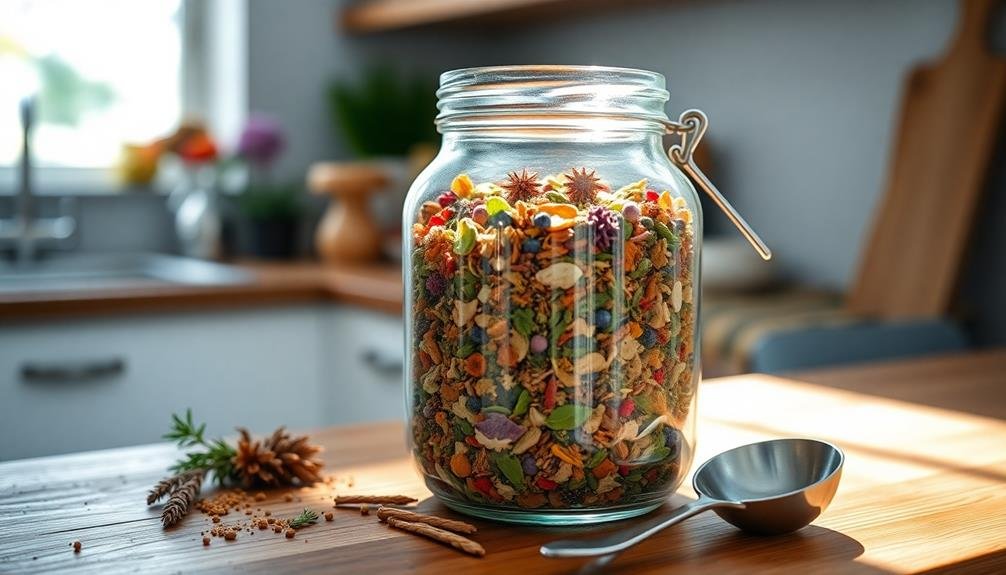
To keep your immune-boosting herbal tea blend fresh and potent, you'll need to store it properly.
Use airtight containers to protect the herbs from moisture and air, and place them in a cool, dark location to preserve their beneficial properties.
Don't forget to label your containers with the blend's name and date of preparation, ensuring you use the herbs while they're at their peak effectiveness.
Airtight Containers
Proper storage is essential for maintaining the potency and freshness of your immune-boosting herbal tea blend. Airtight containers are your best bet for preserving the quality of your herbs. When choosing a container, opt for glass or ceramic options, as they won't impart any flavors or odors to your blend. Avoid plastic containers, which can absorb aromas and potentially leach chemicals into your herbs.
Select containers with tight-fitting lids to keep moisture and air out. This will prevent mold growth and protect the herbs' volatile oils, which are responsible for their medicinal properties. You'll want to store your containers in a cool, dark place away from direct sunlight and heat sources.
Here's why airtight storage is vital for your herbal blend:
- Preserves potency: Keeps essential oils intact, maintaining the herbs' therapeutic qualities
- Prevents contamination: Protects against moisture, dust, and insects
- Extends shelf life: Slows down the natural degradation process of dried herbs
- Maintains flavor: Preserves the delicate taste profile of your blend
Cool, Dark Storage
Once you've selected the perfect airtight container for your immune-boosting herbal tea blend, it's crucial to find an ideal storage location. A cool, dark place is your best bet for preserving the potency and flavor of your herbal mix.
Avoid areas exposed to direct sunlight or heat sources, as these can degrade the herbs' beneficial compounds and essential oils. Your kitchen pantry or a dedicated tea cabinet can be excellent choices, provided they're away from the stove and not subject to temperature fluctuations.
If you don't have a suitable cupboard, consider using a drawer or even a decorative box placed in a cool corner of your home. The ideal storage temperature is between 60-70°F (15-21°C).
Remember that humidity is also an enemy of dried herbs. If you live in a particularly humid climate, you might want to add a silica gel packet to your container to absorb excess moisture.
Labeling and Dating
With your immune-boosting herbal tea blend safely stored, it's time to focus on labeling and dating. Proper labeling guarantees you'll always know what's in your blend and when it was made.
Use waterproof labels or permanent markers to clearly write the tea's name, ingredients, and preparation date on the container.
Dating your herbal blend is essential for maintaining its potency and safety. Most dried herbs retain their medicinal properties for about six months to a year when stored correctly. After this time, they may lose effectiveness or even spoil.
To keep track of your blend's freshness:
- Write the preparation date on the label
- Note the expected expiration date (6-12 months from preparation)
- Set a reminder on your phone or calendar to check the blend periodically
- Discard and replace any blend that's past its prime
Potential Side Effects
Despite the numerous benefits of immune-boosting herbal tea blends, it's important to be aware of potential side effects. While generally safe, some herbs can interact with medications or cause allergic reactions in sensitive individuals.
Echinacea, a common ingredient in these blends, may cause nausea, dizziness, or gastrointestinal discomfort in some people. It's also not recommended for those with autoimmune disorders.
Elderberry can cause digestive issues if consumed in large quantities or if the berries are unripe. Ginger, while excellent for digestion, might lead to heartburn or bloating in some cases.
If you're pregnant or nursing, consult your healthcare provider before consuming herbal teas, as some herbs can affect hormone levels or stimulate contractions.
Those with blood disorders or on blood-thinning medications should be cautious with ginger and garlic, as they may increase bleeding risk.
Always start with small amounts to test your tolerance. If you experience any adverse reactions like skin rashes, difficulty breathing, or severe stomach pain, discontinue use immediately and seek medical attention.
Combining With Other Remedies
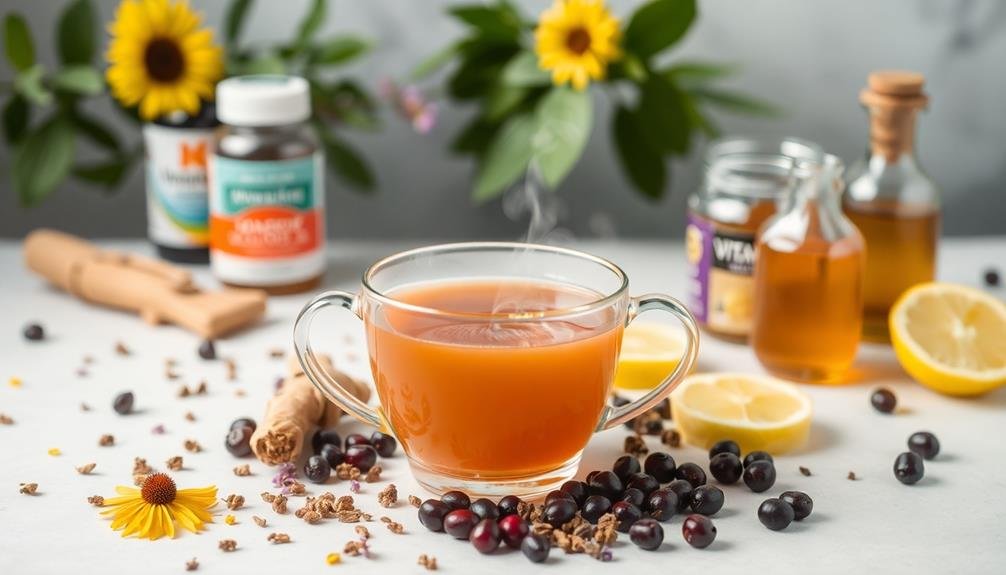
Enhancing the effectiveness of immune-boosting herbal tea blends can be achieved by combining them with other natural remedies.
When you're looking to maximize your body's defense against illnesses, it's crucial to reflect on a holistic approach. By pairing your herbal tea with complementary treatments, you'll create a powerful shield against pathogens.
Here are four effective ways to combine your immune-boosting tea with other remedies:
- Vitamin C supplementation: Add a dose of vitamin C to your daily routine alongside your tea to amplify antioxidant protection.
- Probiotics: Incorporate probiotic-rich foods or supplements to support gut health and strengthen your immune system.
- Essential oils: Use immune-boosting essential oils like eucalyptus or tea tree in a diffuser while sipping your herbal tea.
- Zinc lozenges: Combine zinc lozenges with your tea regimen to help reduce the duration and severity of cold symptoms.
Seasonal Adaptations
As the seasons change, so should your immune-boosting herbal tea blend. Tailor your ingredients to address specific seasonal challenges and optimize your body's defenses.
In winter, focus on warming herbs like ginger and cinnamon to combat cold and flu. Add elderberry for its antiviral properties and rosehips for an extra vitamin C boost.
Spring calls for detoxifying herbs like dandelion root and nettle leaf to support your body's natural cleansing processes. Include peppermint to ease seasonal allergies and boost respiratory health.
Summer's heat demands cooling herbs such as hibiscus and lemon balm. These help regulate body temperature and provide antioxidants to protect against sun damage.
Fall's shifting weather requires adaptogenic herbs like ashwagandha and holy basil to help your body cope with stress and changing conditions. Don't forget echinacea, which can be particularly effective during this time.
Adjust the strength of your blend based on your needs, using more potent combinations during peak illness seasons.
Remember to source high-quality, organic herbs and consult with a healthcare professional before making significant changes to your herbal regimen, especially if you have pre-existing health conditions or are taking medications.
Frequently Asked Questions
Can Children Safely Consume Immune-Boosting Herbal Tea Blends?
You should be cautious when giving herbal teas to children. Some blends may be safe, but others can have side effects. It's best to consult your pediatrician before introducing any immune-boosting herbal teas to your child's diet.
How Long Does It Take to Notice the Effects of Immune-Boosting Teas?
You'll typically notice the effects of immune-boosting teas within a few weeks of regular consumption. However, it's important to remember that individual responses vary. Consistent use, combined with a healthy lifestyle, will yield the best results.
Are There Any Herbs That Should Be Avoided During Pregnancy?
You should avoid certain herbs during pregnancy. Don't use comfrey, ephedra, kava, or pennyroyal. Be cautious with ginger, garlic, and ginkgo. Always consult your healthcare provider before taking any herbal supplements while pregnant.
Can These Herbal Teas Interact With Prescription Medications?
Yes, herbal teas can interact with prescription medications. You should always consult your doctor before combining them. Some herbs might enhance or reduce drug effects, potentially causing adverse reactions or altering your medication's effectiveness.
Is It Possible to Develop Tolerance or Resistance to Immune-Boosting Herbs?
You can develop tolerance to some herbs' effects over time. While it's not common, your body might adapt to certain compounds. It's best to vary your herbal intake and consult a healthcare professional for personalized advice.
In Summary
You've now got the tools to create your own immune-boosting herbal tea blend. Remember, consistency is key. Make this tea a regular part of your routine, especially during cold and flu season. Don't forget to consult your doctor if you're on medication or have health concerns. With these natural remedies at your fingertips, you're well-equipped to support your immune system and fend off pesky colds. Stay healthy and enjoy your homemade herbal shield!

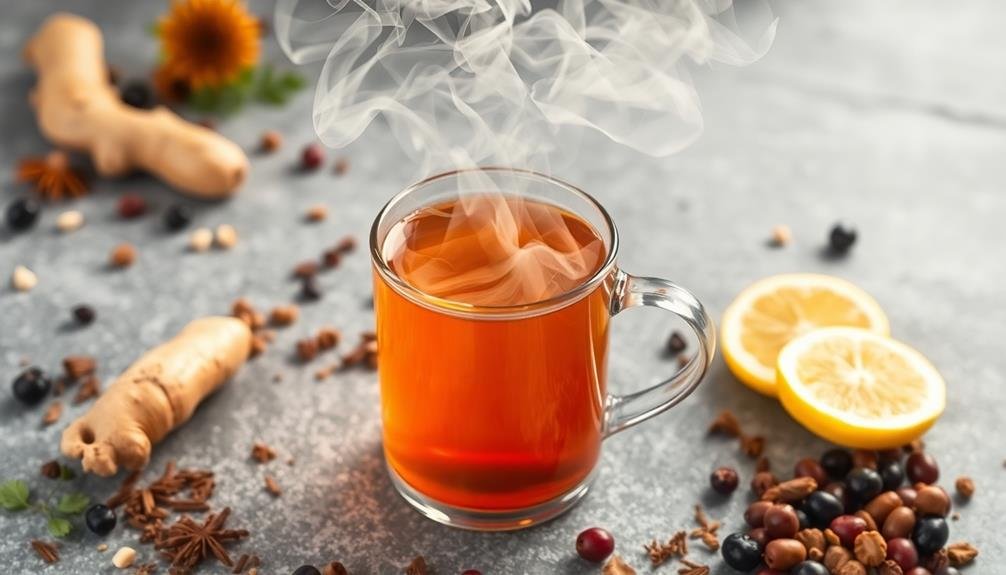



Leave a Reply